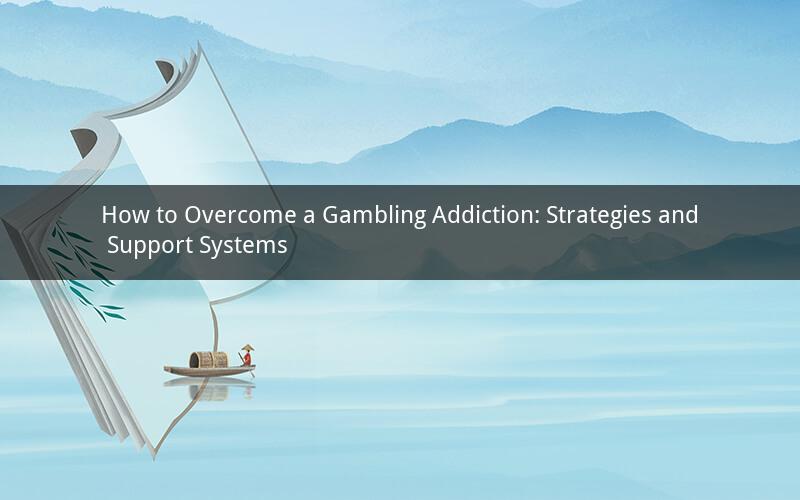
Introduction:
Gambling addiction is a serious issue that can have detrimental effects on an individual's life. It can lead to financial problems, strained relationships, and even mental health issues. If you or someone you know is struggling with a gambling addiction, it's crucial to take steps towards recovery. This article explores various strategies and support systems to help overcome a gambling addiction.
1. Understanding the Problem:
To address a gambling addiction, it's essential to first understand its nature. Gambling addiction is characterized by an inability to control gambling behavior, despite negative consequences. Recognizing the signs and symptoms of gambling addiction is the first step towards overcoming it.
1.1 Signs of a Gambling Addiction:
- Preoccupation with gambling thoughts
- Inability to control gambling behavior
- Repeatedly chasing losses
- Lying to loved ones about gambling activities
- Using gambling as a means to escape problems
2. Strategies for Overcoming a Gambling Addiction:
2.1 Identify Triggers:
Identifying triggers is crucial in managing a gambling addiction. Triggers can be emotional, environmental, or situational. By recognizing these triggers, you can develop strategies to avoid them or cope with them effectively.
2.2 Develop a Support System:
Surrounding yourself with supportive individuals can greatly aid in overcoming a gambling addiction. This can include friends, family, therapists, or support groups. They can provide emotional support, hold you accountable, and offer guidance throughout your recovery journey.
2.3 Create a Personalized Recovery Plan:
A personalized recovery plan is a roadmap to help you overcome a gambling addiction. It should include specific goals, strategies, and actions. This plan can be developed with the help of a therapist or counselor and should be tailored to your individual needs.
2.4 Financial Management:
Gambling addiction often leads to financial difficulties. It's crucial to address these issues by developing a budget, seeking financial counseling, and seeking ways to reduce debt. Setting strict financial boundaries can help prevent relapse.
2.5 Develop Coping Mechanisms:
Finding healthier ways to cope with stress, boredom, or other triggers is vital in overcoming a gambling addiction. Engaging in activities that promote relaxation, such as exercise, meditation, or hobbies, can be effective coping mechanisms.
2.6 Seek Professional Help:
Therapy, counseling, and addiction specialists can provide valuable support and guidance in overcoming a gambling addiction. Various treatment approaches, such as cognitive-behavioral therapy (CBT) and motivational interviewing, have proven effective in treating gambling addiction.
3. Support Systems for Overcoming a Gambling Addiction:
3.1 Support Groups:
Support groups, such as Gamblers Anonymous, offer a safe and supportive environment for individuals struggling with gambling addiction. These groups provide an opportunity to share experiences, gain insights, and offer mutual support.
3.2 Therapeutic Interventions:
Therapeutic interventions, such as individual or group therapy, can help individuals overcome a gambling addiction. These interventions focus on identifying the underlying causes of gambling addiction, developing coping strategies, and addressing any co-occurring mental health issues.
3.3 Family Therapy:
Family therapy can be beneficial for individuals with a gambling addiction, as it helps repair relationships and provides support to family members. Family therapy can address the impact of gambling addiction on the family unit and help family members learn healthy communication and coping skills.
3.4 Legal and Financial Assistance:
Seeking legal and financial assistance can help individuals with a gambling addiction address any legal consequences or financial difficulties they may be facing. This may involve consulting with a lawyer, credit counselor, or financial advisor.
3.5 Self-help Resources:
There are numerous self-help resources available, such as websites, books, and apps, that can provide guidance and support in overcoming a gambling addiction. These resources can offer practical tips, coping strategies, and inspiration for recovery.
Conclusion:
Overcoming a gambling addiction requires a comprehensive approach that includes understanding the problem, developing strategies, seeking professional help, and utilizing support systems. By taking proactive steps towards recovery, individuals can regain control of their lives and break free from the grip of gambling addiction.
Questions and Answers:
1. How can I identify if I have a gambling addiction?
- Look for signs such as preoccupation with gambling thoughts, inability to control gambling behavior, chasing losses, lying about gambling activities, and using gambling as an escape.
2. What are some effective coping mechanisms for dealing with gambling triggers?
- Engage in activities that promote relaxation, such as exercise, meditation, hobbies, or spending time with loved ones.
3. How can I seek support for my gambling addiction?
- Reach out to friends, family, therapists, support groups, or organizations like Gamblers Anonymous for emotional support and guidance.
4. Can therapy help in overcoming a gambling addiction?
- Yes, therapy, such as cognitive-behavioral therapy (CBT) or motivational interviewing, can be effective in treating gambling addiction by addressing underlying causes and developing coping strategies.
5. Are there any legal consequences of a gambling addiction?
- Legal consequences can vary depending on the severity of the addiction and the laws in your area. It's essential to seek legal advice if you're facing any legal issues related to gambling.